 Taking a peek at the UV index to gauge how much sunscreen and protective clothing to wear is par for the course during the summer. But predicting just how bad mosquitoes might be is another story. For visitors to the National Park unfairly voted the worst to visit due to its many mosquitoes, there is a way to anticipate just how bad these biters may be. The Mosquito Meter or “Skeeter Meter” at Congaree National Park near Columbia, South Carolina has six levels: All Clear, Mild, Moderate, Severe, Ruthless, and War Zone. …With the Skeeter Meter and educating people about safely visiting Congaree, the park has embraced their reputation for mosquitoes instead of fighting it. At least 20 different mosquito species are found in this park, which includes the largest remaining intact expanse of old growth bottomland hardwood forest in the southeastern United States. …To protect wildlife and biodiversity in the park, it will not spray pesticides to control the mosquito population.
Taking a peek at the UV index to gauge how much sunscreen and protective clothing to wear is par for the course during the summer. But predicting just how bad mosquitoes might be is another story. For visitors to the National Park unfairly voted the worst to visit due to its many mosquitoes, there is a way to anticipate just how bad these biters may be. The Mosquito Meter or “Skeeter Meter” at Congaree National Park near Columbia, South Carolina has six levels: All Clear, Mild, Moderate, Severe, Ruthless, and War Zone. …With the Skeeter Meter and educating people about safely visiting Congaree, the park has embraced their reputation for mosquitoes instead of fighting it. At least 20 different mosquito species are found in this park, which includes the largest remaining intact expanse of old growth bottomland hardwood forest in the southeastern United States. …To protect wildlife and biodiversity in the park, it will not spray pesticides to control the mosquito population.


 KINGSPORT, Tennessee — It could be the third or fourth quarter of 2026 before an anaerobic digester is completed to help with odor mitigation at the Kingsport mill, Domtar officials shared Tuesday. Charlie Floyd, VP of strategic capital projects for Domtar, and Bonnie Depew, environmental manager at Domtar’s Kingsport mill, presented updates about Project Bandit to the Kingsport Economic Development Board. Floyd said the biggest holdup is waiting on permits from the Tennessee Department of Environment and Conservation. TDEC has already asked for two extensions to review the permit application, state records show. …His hope is for the permit to be in the hands of Domtar by the end of the month. Over 80% of the equipment for the anaerobic digester has been purchased, according to Floyd. …At the height of construction, Floyd said there will be around 150 contractors on site to help build the digester and associated equipment.
KINGSPORT, Tennessee — It could be the third or fourth quarter of 2026 before an anaerobic digester is completed to help with odor mitigation at the Kingsport mill, Domtar officials shared Tuesday. Charlie Floyd, VP of strategic capital projects for Domtar, and Bonnie Depew, environmental manager at Domtar’s Kingsport mill, presented updates about Project Bandit to the Kingsport Economic Development Board. Floyd said the biggest holdup is waiting on permits from the Tennessee Department of Environment and Conservation. TDEC has already asked for two extensions to review the permit application, state records show. …His hope is for the permit to be in the hands of Domtar by the end of the month. Over 80% of the equipment for the anaerobic digester has been purchased, according to Floyd. …At the height of construction, Floyd said there will be around 150 contractors on site to help build the digester and associated equipment.
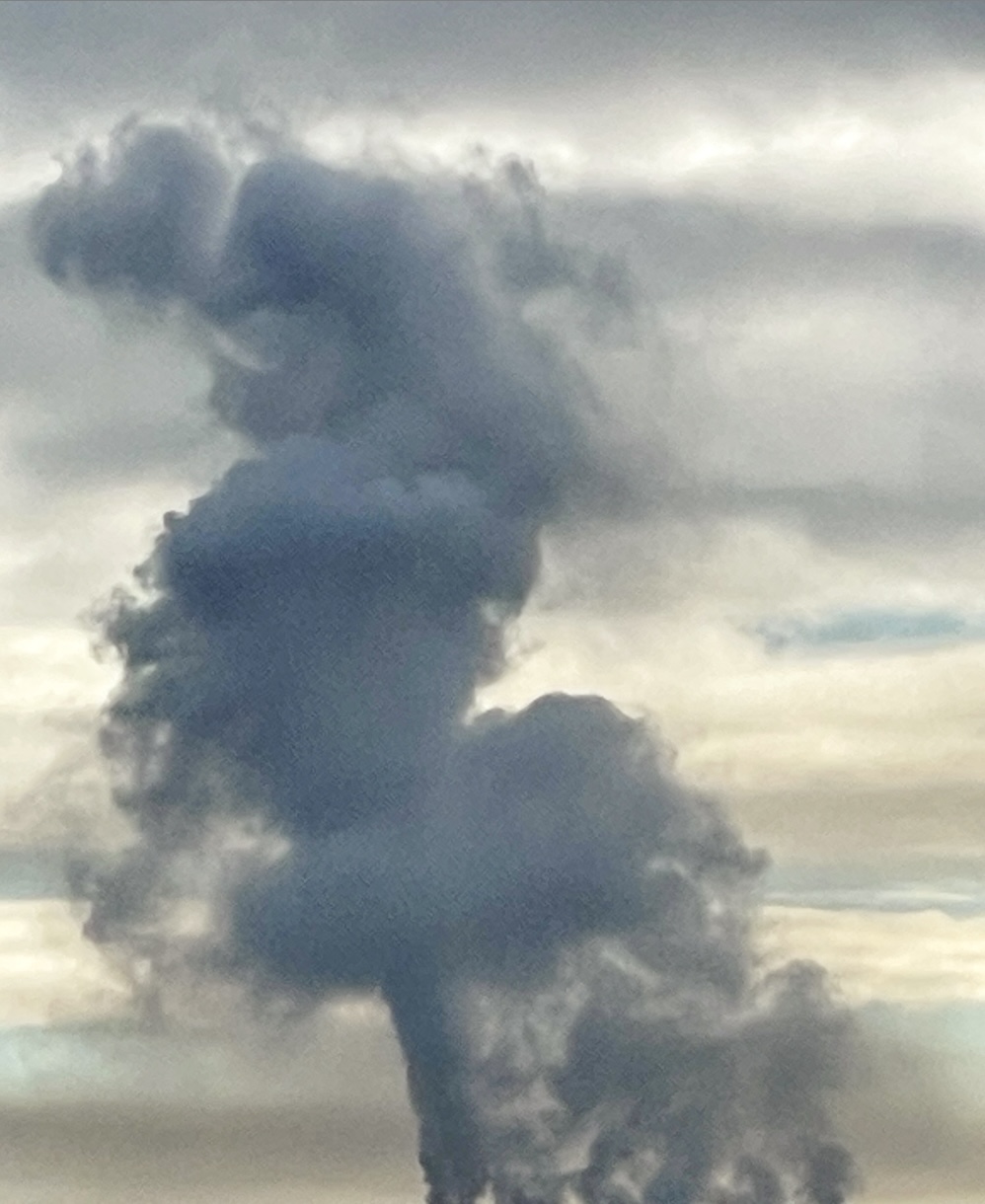 YORK COUNTY — South Carolina’s New Indy paper mill… releases more of a powerful neurotoxin into the air than any other major paper plant in the country, a new report says. The amount of mercury leaving New Indy’s York County plant is
YORK COUNTY — South Carolina’s New Indy paper mill… releases more of a powerful neurotoxin into the air than any other major paper plant in the country, a new report says. The amount of mercury leaving New Indy’s York County plant is 
 GREENVILLE , SC — The U.S. Endowment for Forestry and Communities released its 2024 Annual Report. The report highlights a year of expanded reach with $29.1 million awarded across 109 projects in 30 states and Washington, D.C., through innovative programs that strengthen the links between healthy forests, resilient communities and sustainable markets. The report details the Endowment’s sharpened focus on transformative initiatives, including the launch of an impact investing program, advancements in forest carbon transparency and streamlined market access for domestic wood fibers. “2024 was a pivotal year where we not only supported critical projects but also invested in scalable, sustainable solutions,” said Pete Madden, president and CEO of the Endowment. “By magnifying the connections between working forests, strong markets and vibrant communities, we are helping to drive systemic change across the forestry sector.”
GREENVILLE , SC — The U.S. Endowment for Forestry and Communities released its 2024 Annual Report. The report highlights a year of expanded reach with $29.1 million awarded across 109 projects in 30 states and Washington, D.C., through innovative programs that strengthen the links between healthy forests, resilient communities and sustainable markets. The report details the Endowment’s sharpened focus on transformative initiatives, including the launch of an impact investing program, advancements in forest carbon transparency and streamlined market access for domestic wood fibers. “2024 was a pivotal year where we not only supported critical projects but also invested in scalable, sustainable solutions,” said Pete Madden, president and CEO of the Endowment. “By magnifying the connections between working forests, strong markets and vibrant communities, we are helping to drive systemic change across the forestry sector.”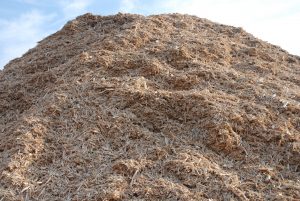 A German wood paneling maker plans to open a $250 million manufacturing plant in South Carolina’s rural Clarendon County. Homanit announced Wednesday it will build its first United States manufacturing facility on 140 acres near the small community of Alcolu — population 425. The company pledged to employ 300 people in the area located off Interstate 95, about 40 miles north of its intersection with I-26. “This investment marks a significant milestone for our company, and we’re proud to become part of such a vibrant and forward-looking region,” Homanit Managing Director Fritz Homann said in a statement. “The area’s skilled workforce, strategic location and strong infrastructure make Clarendon County the ideal foundation for our next phase of growth in North America.” The announcement marks the largest single investment in Clarendon County economic development history, according to Central SC Alliance President Jason Giulietti.
A German wood paneling maker plans to open a $250 million manufacturing plant in South Carolina’s rural Clarendon County. Homanit announced Wednesday it will build its first United States manufacturing facility on 140 acres near the small community of Alcolu — population 425. The company pledged to employ 300 people in the area located off Interstate 95, about 40 miles north of its intersection with I-26. “This investment marks a significant milestone for our company, and we’re proud to become part of such a vibrant and forward-looking region,” Homanit Managing Director Fritz Homann said in a statement. “The area’s skilled workforce, strategic location and strong infrastructure make Clarendon County the ideal foundation for our next phase of growth in North America.” The announcement marks the largest single investment in Clarendon County economic development history, according to Central SC Alliance President Jason Giulietti.
 Q1 2025 exports of Southern Pine lumber (treated and untreated) were 12% behind the same quarter in 2024 at 122 MMBF, but up 2% over the fourth quarter of 2024. On a monthly basis, Southern Pine lumber exports were down 20% in March over March 2024 but up 4.6% over February 2025. When looking at the report by dollar value, Southern Pine exports are down 7% to $50 million in the first quarter of 2025 compared to the same period in 2024, but down 17% over the fourth quarter of 2024. Mexico led the way at $13.2 million, followed by the Dominican Republic at $10.4 million, and Canada at $4.3 million. The total global value in March hit a six-month high of $18 million. Treated lumber exports, meanwhile, were down 19% compared to the first quarter of 2024 at $28 million and down 6% over the fourth quarter of 2024.
Q1 2025 exports of Southern Pine lumber (treated and untreated) were 12% behind the same quarter in 2024 at 122 MMBF, but up 2% over the fourth quarter of 2024. On a monthly basis, Southern Pine lumber exports were down 20% in March over March 2024 but up 4.6% over February 2025. When looking at the report by dollar value, Southern Pine exports are down 7% to $50 million in the first quarter of 2025 compared to the same period in 2024, but down 17% over the fourth quarter of 2024. Mexico led the way at $13.2 million, followed by the Dominican Republic at $10.4 million, and Canada at $4.3 million. The total global value in March hit a six-month high of $18 million. Treated lumber exports, meanwhile, were down 19% compared to the first quarter of 2024 at $28 million and down 6% over the fourth quarter of 2024.


 Pulp and paper company Green Bay Packaging will be breaking ground on a $1 billion expansion to its Morrilton packaging plant Tuesday, according to a news release from Gov. Sarah Huckabee Sanders’ office. The company announced an expansion of its Arkansas Kraft Mill in Morrilton in December. The news release from Sanders’ office lauded the investment as the “largest capital investment project in Central Arkansas’ history.” It comes about a month after the announcement of a $1 billion data center in Little Rock, which was referred to as the “largest economic development capital investment” in Little Rock’s history. Green Bay’s multi-year expansion is geared toward modernization. According to a release, it will “significantly enhance the infrastructure of the mill” and, among other investments, it will involve the installation of an electric turbine generator, which will “substantially reduce” the plant’s Scope One and Scope Two greenhouse gas emissions.
Pulp and paper company Green Bay Packaging will be breaking ground on a $1 billion expansion to its Morrilton packaging plant Tuesday, according to a news release from Gov. Sarah Huckabee Sanders’ office. The company announced an expansion of its Arkansas Kraft Mill in Morrilton in December. The news release from Sanders’ office lauded the investment as the “largest capital investment project in Central Arkansas’ history.” It comes about a month after the announcement of a $1 billion data center in Little Rock, which was referred to as the “largest economic development capital investment” in Little Rock’s history. Green Bay’s multi-year expansion is geared toward modernization. According to a release, it will “significantly enhance the infrastructure of the mill” and, among other investments, it will involve the installation of an electric turbine generator, which will “substantially reduce” the plant’s Scope One and Scope Two greenhouse gas emissions. Mass timber continues to gain traction in the United States for its sustainability, strength and aesthetic appeal. …In just the last four years, Texas saw a 168% increase in the amount of mass timber projects either in design, construction or completed. As mass timber developments in Texas increase in popularity, owners and contractors face a critical decision: whether to source the material domestically or internationally. The decision isn’t as simple as price — although it is a big factor. There are other points to consider when selecting your mass timber provider. …With threats of tariffs and rising material costs, builders might feel inclined to source mass timber from domestic providers. According to Forisk, an industry research and consulting firm, there are 38 mass timber production facilities across the United States and Canada —24 of which can produce cross-laminated timber (CLT). Nearly 51% of those facilities are located in the Northwest region of the United States.
Mass timber continues to gain traction in the United States for its sustainability, strength and aesthetic appeal. …In just the last four years, Texas saw a 168% increase in the amount of mass timber projects either in design, construction or completed. As mass timber developments in Texas increase in popularity, owners and contractors face a critical decision: whether to source the material domestically or internationally. The decision isn’t as simple as price — although it is a big factor. There are other points to consider when selecting your mass timber provider. …With threats of tariffs and rising material costs, builders might feel inclined to source mass timber from domestic providers. According to Forisk, an industry research and consulting firm, there are 38 mass timber production facilities across the United States and Canada —24 of which can produce cross-laminated timber (CLT). Nearly 51% of those facilities are located in the Northwest region of the United States.
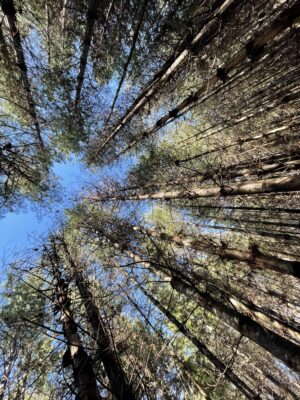 Tim Meyer’s interest in the outdoors goes back decades, beginning with hunting. In 1987, he bought 115 acres of land in Davis County in southern Iowa. It was on that land that his love of the outdoors — and his interest in developing a healthy forest — grew. Today, that property has grown to 384 acres, which includes 320 acres of forest. Last year, Meyer’s knowledge and care for trees was honored when he and his wife, Pam Goschke, were named Iowa’s Outstanding Tree Farmers by the Iowa Tree Farm Committee. The award honored Meyer’s work fostering woodlands across the state, but learning the ways of tending to woodlands wasn’t always easy. “I didn’t realize how cruel nature can be,” said Meyer, who lives in Iowa County. “If you leave a forest unmanaged, there’s really a war going on out there in the forest because, you know, bad trees outgrow good trees.”
Tim Meyer’s interest in the outdoors goes back decades, beginning with hunting. In 1987, he bought 115 acres of land in Davis County in southern Iowa. It was on that land that his love of the outdoors — and his interest in developing a healthy forest — grew. Today, that property has grown to 384 acres, which includes 320 acres of forest. Last year, Meyer’s knowledge and care for trees was honored when he and his wife, Pam Goschke, were named Iowa’s Outstanding Tree Farmers by the Iowa Tree Farm Committee. The award honored Meyer’s work fostering woodlands across the state, but learning the ways of tending to woodlands wasn’t always easy. “I didn’t realize how cruel nature can be,” said Meyer, who lives in Iowa County. “If you leave a forest unmanaged, there’s really a war going on out there in the forest because, you know, bad trees outgrow good trees.” As Western North Carolina’s forests recover from Hurricane Helene, environmental groups say Pisgah and Nantahala face a one-two punch from the federal government, potentially setting the stage for further destruction. For as long as the country has had national forests, logging has been a part of their management, but those needs are also weighed against the need to maintain habitat, recreational opportunities, protect local water systems and defend wildlife. In the past few years, the U.S. Forest Service has opened up more land to logging and now with a recent executive order calling for increased timber production across the country, environmental nonprofits like Center for Biological Diversity, the Sierra Club, Defenders of Wildlife and Asheville-based MountainTrue are suing to prevent what they believe could severely damage habitat in a way that could take decades to recover from.
As Western North Carolina’s forests recover from Hurricane Helene, environmental groups say Pisgah and Nantahala face a one-two punch from the federal government, potentially setting the stage for further destruction. For as long as the country has had national forests, logging has been a part of their management, but those needs are also weighed against the need to maintain habitat, recreational opportunities, protect local water systems and defend wildlife. In the past few years, the U.S. Forest Service has opened up more land to logging and now with a recent executive order calling for increased timber production across the country, environmental nonprofits like Center for Biological Diversity, the Sierra Club, Defenders of Wildlife and Asheville-based MountainTrue are suing to prevent what they believe could severely damage habitat in a way that could take decades to recover from.


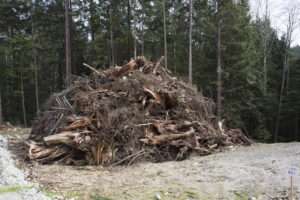 Sawmills are working to recycle trees blown down by Hurricane Helene to assist wildland firefighters while boosting domestic timber production. Many of the trees downed by the storm are usable, according to Johnny Evans, owner of EvAns Lumber Co. in Manchester, Tennessee. About 6% of the lumber produced at his facility comes from trees that fell during natural disasters. The Tennessee Department of Agriculture’s Forestry Division estimated it could take at least three years for the thickest trees downed by Hurricane Helene to dry out enough to become potential wildfire fuel. However, those trees can still hinder firefighting efforts by getting in the way of bulldozers used to create firelines. “Those trees are there just blocking the dozers. So we have to send in crews to clear a path for the dozers,” Megan Carpenter, a spokesperson for the Tennessee Department of Agriculture’s Forestry Division, said.
Sawmills are working to recycle trees blown down by Hurricane Helene to assist wildland firefighters while boosting domestic timber production. Many of the trees downed by the storm are usable, according to Johnny Evans, owner of EvAns Lumber Co. in Manchester, Tennessee. About 6% of the lumber produced at his facility comes from trees that fell during natural disasters. The Tennessee Department of Agriculture’s Forestry Division estimated it could take at least three years for the thickest trees downed by Hurricane Helene to dry out enough to become potential wildfire fuel. However, those trees can still hinder firefighting efforts by getting in the way of bulldozers used to create firelines. “Those trees are there just blocking the dozers. So we have to send in crews to clear a path for the dozers,” Megan Carpenter, a spokesperson for the Tennessee Department of Agriculture’s Forestry Division, said. MAINE, USA — A law signed by Gov. Janet Mills last week requires landowners who are participating in the forest carbon credit market to report basic data — including a landowner’s name, contact information, date of enrollment and total enrolled acreage — to the state on an annual basis, information the state will use to create a database and track the impact of carbon credits on Maine’s forests. “We need to understand how Maine woodland owners are participating in the emerging forest carbon market, given both Maine’s forest-based economy and its climate change initiatives,” said Morten Moesswilde, the division director of Forest Policy and Management for the Department of Agriculture, Conservation and Forestry, in a work session on the legislation in February. …The law was supported by conservation organizations as well as the Maine Forest Products Council and several woodlot owners, who stressed the importance of understanding an emerging market.
MAINE, USA — A law signed by Gov. Janet Mills last week requires landowners who are participating in the forest carbon credit market to report basic data — including a landowner’s name, contact information, date of enrollment and total enrolled acreage — to the state on an annual basis, information the state will use to create a database and track the impact of carbon credits on Maine’s forests. “We need to understand how Maine woodland owners are participating in the emerging forest carbon market, given both Maine’s forest-based economy and its climate change initiatives,” said Morten Moesswilde, the division director of Forest Policy and Management for the Department of Agriculture, Conservation and Forestry, in a work session on the legislation in February. …The law was supported by conservation organizations as well as the Maine Forest Products Council and several woodlot owners, who stressed the importance of understanding an emerging market.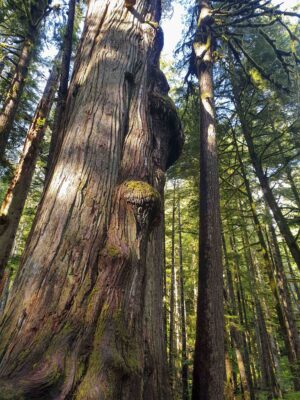 Thousands of acres of deep-woods habitats at Arcadia Dunes are now part of a nationwide network of current and future old-growth forests. The wooded areas at the C.S. Mott Nature Preserve in Benzie County this week became the latest place in Michigan to be inducted into the Old-Growth Forest Network, which now includes more than 270 permanently protected forests nationwide. The forest near the Lake Michigan shoreline boasts unique microclimates teeming with old beech and hemlock trees, spring wildflowers, and rare native plants. Grand Traverse Regional Land Conservancy hosted a two-mile hike Wednesday, May 21, along the preserve’s Dryhill Trail Chestnut Loop to celebrate the northern mesic forest being added to the nationwide old-growth roster. The nature preserve is the conservancy’s largest and includes a mix of secondary hardwoods, coastal dunes, and open fields around old farmland and pastures.
Thousands of acres of deep-woods habitats at Arcadia Dunes are now part of a nationwide network of current and future old-growth forests. The wooded areas at the C.S. Mott Nature Preserve in Benzie County this week became the latest place in Michigan to be inducted into the Old-Growth Forest Network, which now includes more than 270 permanently protected forests nationwide. The forest near the Lake Michigan shoreline boasts unique microclimates teeming with old beech and hemlock trees, spring wildflowers, and rare native plants. Grand Traverse Regional Land Conservancy hosted a two-mile hike Wednesday, May 21, along the preserve’s Dryhill Trail Chestnut Loop to celebrate the northern mesic forest being added to the nationwide old-growth roster. The nature preserve is the conservancy’s largest and includes a mix of secondary hardwoods, coastal dunes, and open fields around old farmland and pastures.
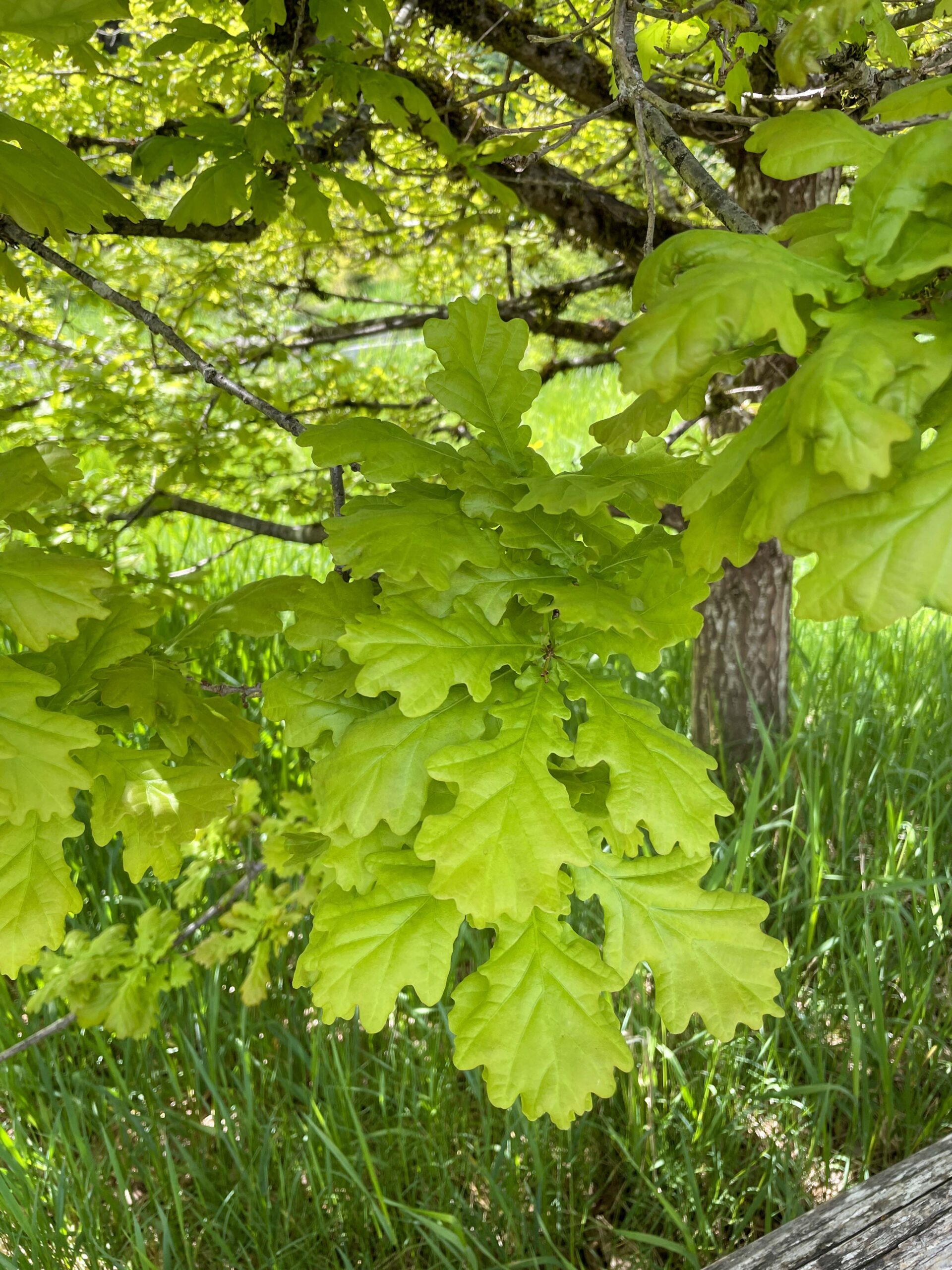 Jim Thorpe – Pennsylvania — It was a sight like no other, last month, smoke clouded the air as a wildfire spread on Bear Mountain in Jim Thorpe. The fire burned 500 acres in what the Department of Environmental and Natural Resources called the Packerton fire. “We are really still evaluating; it’s probably still too early to tell. Certainly, some trees got killed in that process, and we are still evaluating how extensive the damage was, explained Seth Cassell, Director of the Bureau of Forestry with DCNR. On Arbor Day, DCNR launched an online donation drive for communities impacted by wildfires. … Officials with DCNR say there are several types of trees that make up the forests of Carbon County. “Where the fire was, there is often pine trees, oak trees, we see a lot of chestnut oak trees in those areas, and some of those trees are there because of repeat fires in those areas.”
Jim Thorpe – Pennsylvania — It was a sight like no other, last month, smoke clouded the air as a wildfire spread on Bear Mountain in Jim Thorpe. The fire burned 500 acres in what the Department of Environmental and Natural Resources called the Packerton fire. “We are really still evaluating; it’s probably still too early to tell. Certainly, some trees got killed in that process, and we are still evaluating how extensive the damage was, explained Seth Cassell, Director of the Bureau of Forestry with DCNR. On Arbor Day, DCNR launched an online donation drive for communities impacted by wildfires. … Officials with DCNR say there are several types of trees that make up the forests of Carbon County. “Where the fire was, there is often pine trees, oak trees, we see a lot of chestnut oak trees in those areas, and some of those trees are there because of repeat fires in those areas.”



 TEXAS — A plan to open a bioenergy plant in Newton County has reached a new milestone with a landmark deal to supply wood for the site in Bon Wier. Mike Lout with KJAS, reports Nick Andrews, President and CEO of the Scottsdale, Arizona-based USA Bioenergy, announced on Tuesday that his company has
TEXAS — A plan to open a bioenergy plant in Newton County has reached a new milestone with a landmark deal to supply wood for the site in Bon Wier. Mike Lout with KJAS, reports Nick Andrews, President and CEO of the Scottsdale, Arizona-based USA Bioenergy, announced on Tuesday that his company has 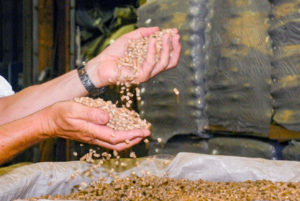 GEORGETOWN, South Carolina — Over 650 Georgetown residents have signed a petition opposing a proposed biomass plant at the site of the International Paper mill that closed last year. The group Citizens for Georgetown says it is working to revitalize the town’s waterfront through “thoughtful redevelopment.” 653 people are opposing the plant that would generate energy for Santee Cooper from tree waste. …Citizens for Georgetown Chairman Tom Swatzel. “Now, we face a critical choice: leave decades of pollution in the land and water, continue with heavy industry OR clean up the site and reimagine these properties into a vibrant, sustainable future that benefits all residents.” …State Sen. Stephen Goldfinch expressed cautious optimism over the proposed plant, saying that it could involve an investment of nearly $4 billion and create new jobs.
GEORGETOWN, South Carolina — Over 650 Georgetown residents have signed a petition opposing a proposed biomass plant at the site of the International Paper mill that closed last year. The group Citizens for Georgetown says it is working to revitalize the town’s waterfront through “thoughtful redevelopment.” 653 people are opposing the plant that would generate energy for Santee Cooper from tree waste. …Citizens for Georgetown Chairman Tom Swatzel. “Now, we face a critical choice: leave decades of pollution in the land and water, continue with heavy industry OR clean up the site and reimagine these properties into a vibrant, sustainable future that benefits all residents.” …State Sen. Stephen Goldfinch expressed cautious optimism over the proposed plant, saying that it could involve an investment of nearly $4 billion and create new jobs.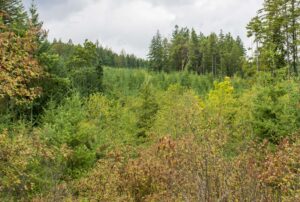 A law signed by Gov. Janet Mills last week
A law signed by Gov. Janet Mills last week  Of the two dozen people who showed up for a meeting to talk about a proposed biomass energy plant in Georgetown, five were from conservation groups. Another five were reporters.
Of the two dozen people who showed up for a meeting to talk about a proposed biomass energy plant in Georgetown, five were from conservation groups. Another five were reporters. New Jersey — A wildfire that began Friday in the Wharton State Forest in Burlington County is now 80% contained, fire officials said Sunday. The New Jersey Forest Fire Service posted on its Facebook page a total of 5,750 acres were scorched since the blaze began Friday morning. It was first spotted near the Carranza Memorial in the state forest. By 11 p.m. Friday, flames had grown to 3,250 acres, state fire officials had said. The blaze, dubbed the Mines Spung Wildfire, is located within Wharton State Forest in Shamong Township. A wildfire is defined by state fire officials as an uncontrolled fire burning different types of vegetation covering the land, with a “major wildfire” being anything that exceeds 100 acres in size. Crews on Sunday were continuing to mop up hot spots and patrol the fire perimeter, state fire officials said.
New Jersey — A wildfire that began Friday in the Wharton State Forest in Burlington County is now 80% contained, fire officials said Sunday. The New Jersey Forest Fire Service posted on its Facebook page a total of 5,750 acres were scorched since the blaze began Friday morning. It was first spotted near the Carranza Memorial in the state forest. By 11 p.m. Friday, flames had grown to 3,250 acres, state fire officials had said. The blaze, dubbed the Mines Spung Wildfire, is located within Wharton State Forest in Shamong Township. A wildfire is defined by state fire officials as an uncontrolled fire burning different types of vegetation covering the land, with a “major wildfire” being anything that exceeds 100 acres in size. Crews on Sunday were continuing to mop up hot spots and patrol the fire perimeter, state fire officials said.